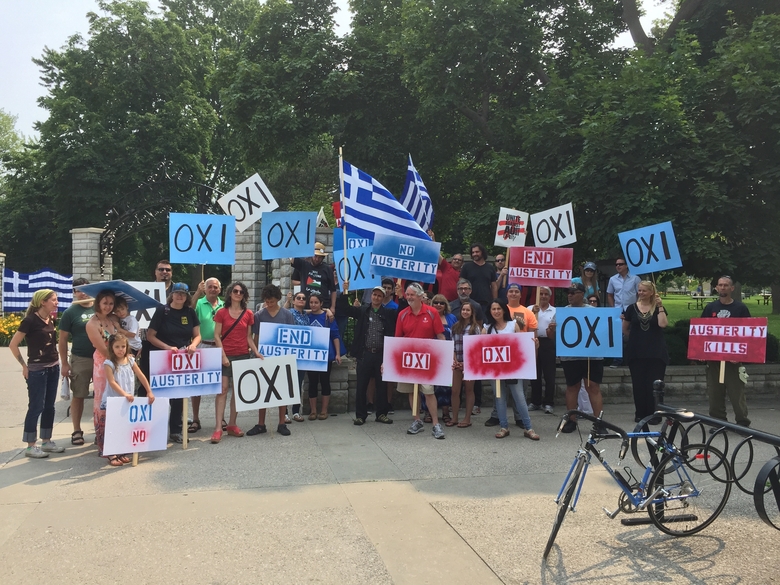On June 26, 2023, Greece’s right-wing New Democracy Party (NDP), led by Harvard-educated, former banker Kyriakos Mitsotakis, secured an outright majority in Greece’s Parliamentary election. It did so with the lowest turnout since the fall of Greece’s U.S.-backed military junta in 1974, and the support of a mere 21.4% of eligible voters.
At the same time, the nominally left-wing Syriza, led by former Greek Prime Minister Alexis Tsipras, suffered a devastating defeat. Syriza secured only 17.8% of the vote – its lowest share of the popular vote since it first came to power in 2015. Mercifully, Tsipras later resigned from the leadership of Syriza, a position he had held for fifteen years.
How did it come to this?
The Greek Financial Crisis of 2009/2010
In 2009/2010, Greece rapidly descended into a financial crisis. The European Union’s political elite attributed the crisis to the ‘profligacy’ of Greece’s government and its people.
As former Syriza MP and economist, Costas Lapavitsas, has explained, that narrative was false. The Greek financial crisis was, in fact, a balance of payments crisis. According to Lapavitsas:
Balance of payments crises come in a variety of forms but tend to break out as private capital flows to private or sovereign borrowers suddenly dry up in international markets. Inability to borrow by private or sovereign borrowers sets off a train of events: fall of the exchange rate, shrinkage of domestic credit, inability to make payments to exporters from abroad and to domestic suppliers, and eventually a recession with falling output and rising unemployment.
[…]The realization that the Greek crisis was initially a balance of payments crisis came neither easily, nor naturally, to the policy-making apparatus of the EU. The official response in early 2010 was that the Eurozone turmoil had been caused by Greek dishonesty, incompetence, and the like. Lack of understanding made for considerable vindictiveness toward Greece, and even led to the imposition of absurdly punitive interest rates on the initial loans, presumably to deal with “moral hazard.” Only a few voices at the time pointed to the underlying nature of the Eurozone crisis, and these typically came from outside the economics mainstream.
As Lapavitsas long argued, Greece’s balance of payments crisis erupted due to a loss of Greek competitiveness following Greece’s entry into the European Monetary Union (EMU):
There is no doubt that Greek competitiveness within the Eurozone declined essentially because the nominal remuneration of Greek labor rose faster than that of German labor, the latter remaining essentially frozen throughout the 2000s.
The real outlier in the Eurozone in this respect was not Greece but Germany, which has applied extraordinary wage restraint on its own workers since the end of the 1990s. The resulting divergences in unit labor costs (and correlated inflation) could not be offset through the adjustment of exchange rates because the EMU has eliminated that option. Put differently, the EMU became a trap for its members, since in the 2000’s, unit labor costs diverged systematically among a group of countries that have historically had dense trade relations, which used to be adjusted typically through exchange rate realignments. In the absence of adjustment, the loss of competitiveness by one has tended to be reflected in the gain of competitiveness by another.
Crushing Austerity
Rather than acknowledge and address the root causes of the Greek financial crisis, Greece’s ‘troika’ of creditors – the IMF, the European Central Bank and the European Commission — demanded that Greece’s government adopt radical measures of neoliberal austerity. They included steep increases in taxes and deep cuts in government spending on civil servants’ salaries, pensions and healthcare.
The effects were catastrophic.
By 2016, Greece’s economy had contracted by 25%. Unemployment soared to 27% (from 8% before the crisis began), with youth unemployment at 50%. One-in-five Greeks lived in severe poverty. The suicide rate soared.
Greece also suffered a massive ‘brain drain’. With a population of approximately 11 million at the outset of the crisis, some 350,000 Greeks, many of them relatively young and highly educated, left the country between 2010 and 2013. Their departure impaired Greece’s ability to recover from the crisis.
The conventional wisdom was that austerity would enhance Greece’s ability to service its debts, but instead – and as was readily foreseeable – the severe contraction in the Greek economy diminished Greece’s debt-service capacity. Greece’s debt-to-GDP ratio soared from 136.6% in 2010 to 189.2% in 2015.
The ‘radically left’ Syriza to the rescue?
Against the backdrop of massive public anger, Syriza came to power in January 2015. It did so while holding itself out as a party of the ‘radical left’.
Among other things, Syriza’s 2015 electoral platform, dubbed “The Thessaloniki Programme”, called for:
- The write-off of the greater part of Greece’s public debt so that it would become sustainable;
- The inclusion of a “growth clause” in the repayment of the remaining part of Greece’s debt so that it would be growth-financed and not budget-financed;
- The exclusion of public investment from the restrictions of the austerity package;
- A “European New Deal” of public investment financed by the European Investment Bank;
- Quantitative easing by the ECB with direct purchases of sovereign bonds;
- A ‘gradual’ restoring of salaries and pensions so as to increase consumption and demand; and
- A “rebuilding [of] the welfare state.
In substance, The Thessaloniki Program did not call for the implementation of socialism. For that reason, Syriza’s platform could not fairly be described as ‘radically left’. Nonetheless, its platform would prove to be a bridge too far for the EU’s austerity fanatics.
From euphoria to capitulation
As Greece’s 2015 election approached, polls showed that Syriza’s upstart leftists had a real shot at winning power. Their sudden emergence generated excitement not only within the Greek left, but in the broader EU.
Syriza began to attract the attention and support of other emerging leftist parties in Europe, including Spain’s Podemos and Germany’s Die Linke. The European press was abuzz with the possibility that tiny Greece might soon mount a direct challenge to the neoliberal orthodoxy that had gripped the EU.
In January 2015, I travelled to Greece to cover this potentially historic election for The Real News Network. On January 25, I reported from Syriza’s campaign headquarters as the party swept to power with 36.3% of the popular vote, increasing its seat count by 78, for a total of 149 seats.
This, however, was insufficient for a majority (151 seats). Syriza managed to form a government by entering into a coalition with ANEL, a small populist party that had won seven seats.
Upon taking office, Alexis Tsipras promptly appointed economist Yanis Varoufakis, a self-described “erratic Marxist”, as Greece’s Finance Minister.
From the outset, however, it became clear that Brussels would oppose fiercely all efforts by Greece’s newly elected government to relax the punishing strictures of the EU austerity program.
Upon taking power in late January 2015, the Syriza-led government faced a looming deadline of February 28 for the extension of bailout funding, without which Greece might be forced to exit the eurozone and suffer potentially catastrophic economic consequences. To secure an extension of that funding for a four-month period, Tsipras made the painful concession of agreeing to ongoing oversight of Greece’s finances by the country’s hated “troika” of creditors. The concessions would not end there.
Under the deal struck in February 2015, the Syriza-led government was also obliged to come up with a series of further, painful austerity ‘reforms’ that would be acceptable to the troika.
From March to June 2015, Europe was transfixed by the acrimonious negotiations between Greece and its creditors. As the next deadline for the extension of bailout funding loomed, it became clear that the only ‘reforms’ acceptable to the troika would fall far short of the commitments Syriza had made in The Thessaloniki Program, and would deepen the near-term pain for the Greek people.
As explained at the time by Joseph Stiglitz, former World Bank chief economist and Nobel laureate:
Of course, the economics behind the program that the “troika” (the European Commission, the European Central Bank, and the International Monetary Fund) foisted on Greece five years ago has been abysmal, resulting in a 25% decline in the country’s GDP. I can think of no depression, ever, that has been so deliberate and had such catastrophic consequences: Greece’s rate of youth unemployment, for example, now exceeds 60%.
It is startling that the troika has refused to accept responsibility for any of this or admit how bad its forecasts and models have been. But what is even more surprising is that Europe’s leaders have not even learned. The troika is still demanding that Greece achieve a primary budget surplus (excluding interest payments) of 3.5% of GDP by 2018.
Economists around the world have condemned that target as punitive, because aiming for it will inevitably result in a deeper downturn. Indeed, even if Greece’s debt is restructured beyond anything imaginable, the country will remain in depression if voters there commit to the troika’s target in the snap referendum to be held this weekend.
On June 27, 2015, Tsipras announced that he would put the troika’s demands to a vote of the Greek people. In explaining his decision, he described those demands as “unbearable” and a “humiliation”. “I personally pledge”, declared Tsipras, “that I will respect the result of your democratic choice, whatever that may be.”
On June 28, Greece’s Parliament ratified the government’s proposal for a referendum, to be held on July 5, 2015.
Immediately following the announcement that there would be a referendum, I organized a protest in Canada against the demands of the troika. Protesters held up placards on which were emblazoned the word “οχι” (“no” in Greek). This harkened back to a pivotal moment in modern Greek history, when the former prime minister of Greece, Ioannis Metaxas, refused to let Mussolini’s troops enter Greece on October 28, 1940. Following Metaxas’s refusal, Greeks poured into the streets, shouting “οχι!”

As the date of the referendum approached, Europe’s political elite piled pressure upon Greek voters to accede to the troika’s demands. They did so by threatening that a ‘no’ vote might precipitate Greece’s expulsion from the eurozone.
Despite EU threats, Greek voters rocked the EU establishment by resoundingly rejecting the troika’s demands, by a margin of 61.3% to 38.7%.
Within 24 hours of that historic result, however, Alexis Tsipras shocked Europe by agreeing to impose austerity measures that were even harsher than those that Greek voters had just rejected.
Syriza was plunged into disarray. Yanis Varoufakis immediately resigned as Finance Minister. Weeks later, over twenty Syriza MPs rebelled and formed a new party, called Laiki Enotita (Popular Unity), led by former energy minister Panagiotis Lafazanis.
Confronted by a major internal revolt, Tsipras called a snap election for September 20, 2015.
This left little time for Popular Unity to organize. Unsurprisingly, it narrowly failed to attain the Parliamentary threshold of 3% of the popular vote, and won no seats in the new Parliament. By contrast, the Neo-Nazi Golden Dawn party capitalized on popular outrage to finish third, with 6.3% of the popular vote and 17 seats.
Although Syriza emerged as winner of the September 2015 election, it lost four seats. In addition, the turnout for the September election was a mere 56.2%, the lowest turnout up to that point in time since the fall of the military junta in 1974. (Only the most recent Greek election, held in June of this year, resulted in a lower turnout.)
Syriza managed to retain power by claiming that the troika had left it with no alternative but to impose even harsher austerity measures. According to Tsipras, rejecting those measures would have resulted in a withdrawal of bailout funding, the collapse of Greece’s economy and possible expulsion from the monetary union. At the same time, Tsipras claimed Syriza would administer the troika’s bitter medicine more humanely than its principal rival, NDP.
After four more years of suffering, Greek voters return New Democracy to power
During Syriza’s second term (September 2015 to July 2019), Greece remained mired in penury. From 2015 to 2019, Greek GDP rose by a paltry 5%. By 2019, Greece’s unemployment rate remained above 17%.
Moreover, despite Greece’s severe ‘belt-tightening’, its debt-to-GDP ratio actually rose from 177% in 2015 to 181% in 2019. Thus, the core justification for imposing severe austerity on the Greek people — which was to make Greece’s debt more manageable — proved illusory, as experts had predicted.
When Tsipras called an election in 2019, Syriza confronted a monumental challenge. Its credibility was shredded. Voters now had little reason to trust Tsipras’s claim that a Syriza government would be a more humane alternative to NDP.
Predictably, NDP won Greece’s July 2019 election. It secured a majority of the seats in Parliament with 39.9% of the popular vote. Syriza’s seat count plummeted from 145 to 86 seats on 31.5% of the popular vote.
Tellingly, the turnout for the 2019 election was a mere 57.8% – the second-lowest turnout up to that point in time since the end of the military junta in 1974.
The record of New Democracy since the 2019 election
What might account for NDP’s resounding victory in June of this year? On what record was it able to campaign?
On the positive side of the leger, from 2019 to 2022, Greece’s GDP grew (in current US$) from $205.3 billion to $219.1 billion (a total increase of 6.7% and an average annual increase of 2.2%). By the end of 2022, however, Greece’s GDP remained far below its peak GDP (reached in 2008) of $355.9 billion. From 2008 to 2022, Greece suffered a massive net decrease in GDP of 38.4%.
In addition, from 2019 to 2022, Greece’s unemployment rate decreased from 17.3% to 12.2%, but remained far above the EU unemployment rate of 6.1%.
On the negative side of the leger, Greece’s inflation rate soared after NDP regained power in 2019. In that year, Greece experienced annual inflation of 0.3%, whereas in 2022, its annual inflation rate was 9.6% – slightly above the EU’s annual inflation rate of 9.2%.
By the end of 2022, Greece’s debt-to-GDP ratio of 192% was the second-highest in the OECD, surpassed only by that of Japan.
Despite Greece’s crushing debt, the Mitsotakis government has been on a military spending spree. According to NATO, Greece’s estimated military spending in 2022 was 3.76% of GDP – the highest level of military spending in NATO. The Greek Government’s defence priorities include a “Strategic Defence Relation” with Israel, now widely acknowledged to be an apartheid state.
In November 2022, as the Mitsotakis government showered public money on merchants of death, Amnesty International filed a complaint against the Greek government with the European Committee of Social Rights alleging that austerity measures imposed upon Greece following the economic crisis of 2009/2010 had devastated Greece’s healthcare system, resulting in severe violations of the human right to health.
Moreover, prior to the 2023 election, the Mitsotakis government became embroiled in a major domestic spying scandal. In August 2022, it emerged that the Government had wiretapped the phone of Socialist Pasok leader Nikos Androulakis.
As Politico recently reported, subsequent investigations showed “how the country’s state spy service had an ever-expanding network of politicians and journalists under surveillance, while controversial spyware like Predator was planted on the phones of some people at exactly the same time by as-yet-unknown perpetrators.” The “Predator”spyware was developed by Israeli-controlled corporations that were blacklisted by the U.S. Government in July of this year.
Even worse, the Orwellian Mitsotakis government has attacked press freedom relentlessly. In 2022, Greece supplanted Bulgaria as the EU’s lowest-ranked country in Reporters Without Borders’ annual press freedom list.
Finally, the Mitosakis government has exacerbated the migrant crisis that has afflicted the Mediterranean region in recent years. In June of this year, a trawler carrying migrants from Libya to Greece sunk off the coast of Greece. As reported by The Guardian a few weeks later, multiple survivors said that attempts by the Greek coastguard to tow the vessel had ultimately caused the vessel to sink, which left an estimated 500 people missing.
Greece is now mired in historic levels of voter apathy
A recent op-ed by Daniel Finn, the features editor of Jacobin, summed up the lamentable state of Greek democracy with the headline “The Triumph of Greece’s Authoritarian Right Is the Future the European Union Wants”. Finn explains:
A scandal-plagued conservative who has flaunted his contempt for democratic rights, Kyriakos Mitsotakis, secured a second term in office with 40 percent of the vote. A substantial far-right bloc, divided between three parties, will also have a foothold in parliament, while the Greek left has suffered a crushing defeat.
Mitsotakis owes his current position to the leading players in the European Union, from members of the European Commission to national politicians like Angela Merkel and Jeroen Dijsselbloem. They mounted an unprecedented display of economic force in 2015 to pummel the citizens of Greece into submission and stamp out a popular insurgency against economic vandalism. Having cleared the way for Mitsotakis to take office in a context of profound demoralization, his European partners have condoned and enabled his ugly abuses of power.
Arguably, the harshest indictment of the EU’s austerity obsession is to be found in Greece’s voter turnout data.
Of the 20 legislative elections held in Greece since 1974, the seven lowest turnouts all occurred after the troika began to impose austerity on Greece in 2010. The average turnout for the seven elections held since 2010 was 60.1%. By contrast, the average turnout for the thirteen elections held from 1974 to 2009 was 78.0%.
For the period from 1974 to 2001 – the year in which Greece joined the eurozone — the average turnout was even higher, at 79.3%.
Since 1974, the three lowest voter turnouts all occurred after Tsipras — with an economic gun pointed at Greece’s head — betrayed the result of Greece’s historic 2015 referendum on austerity.
If the dramatic decline in voter engagement confirms anything, it’s that Greek democracy is dead, and the EU killed it.






Can’t be shared on FB right now, but I am now sharing stories like this on à network called Mastodon at the suggestion of The Narwhal.
A sickening state of affairs and shame on the EU. But I wonder could an EU Left Reformist project be built across the continent? I’m often agnostic and struggle with this question because I’d hate to see a series of Eu referendums in the hands of the far right and like the UK you leave the EU but it’s in the hands of market fundamentalists and xenophobic politicians/movements.
I think Trudeau is well on his way to making Canada the next Greece.